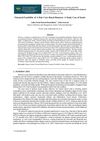 23 citations,
June 2014 in “Journal of Pharmaceutical Sciences”
23 citations,
June 2014 in “Journal of Pharmaceutical Sciences” Finasteride cream helps hair growth with less side effects.
 20 citations,
November 2019 in “Biomolecules”
20 citations,
November 2019 in “Biomolecules” Finasteride reduces response to stress and rewards, affecting behavior and mental health.
 11 citations,
May 2002 in “The Journal of Urology”
11 citations,
May 2002 in “The Journal of Urology” Finasteride doesn't harm bone density in older men with BPH.
 10 citations,
October 2008 in “Andrologia”
10 citations,
October 2008 in “Andrologia” Finasteride changes antioxidant enzyme expression, possibly affecting sperm protection in rats.
 3 citations,
October 1995 in “International Journal of Dermatology”
3 citations,
October 1995 in “International Journal of Dermatology” Finasteride helps treat skin issues like acne and baldness by blocking testosterone conversion.
 November 2020 in “Psychoneuroendocrinology”
November 2020 in “Psychoneuroendocrinology” Finasteride might affect memory by impacting cholinergic system.
 36 citations,
February 2017 in “BMC Complementary and Alternative Medicine”
36 citations,
February 2017 in “BMC Complementary and Alternative Medicine” Geranium sibiricum extract helps hair grow and is more effective than minoxidil but can be toxic in high concentrations.
 32 citations,
March 2020 in “Drug Design Development and Therapy”
32 citations,
March 2020 in “Drug Design Development and Therapy” Finasteride shows promise for female hair loss, but more research needed.
 19 citations,
September 2020 in “Pharmaceutics”
19 citations,
September 2020 in “Pharmaceutics” Sodium Valproate nanospanlastics could be a safe and effective treatment for Androgenic Alopecia, with fewer side effects than minoxidil.
 12 citations,
September 2014 in “Journal of Food Science and Nutrition”
12 citations,
September 2014 in “Journal of Food Science and Nutrition” Platycarya strobilacea extract is a strong antioxidant that can grow hair better than minoxidil.
 10 citations,
October 2018 in “Sexual medicine reviews”
10 citations,
October 2018 in “Sexual medicine reviews” Men using hair loss drugs like finasteride may experience sexual side effects like erectile dysfunction, but it's unclear who will be affected and when. Treating depression and sexual symptoms is suggested, as these men often have higher rates of both. More research is needed to understand why these side effects occur.
 August 2024 in “Journal Integration of Social Studies and Business Development”
August 2024 in “Journal Integration of Social Studies and Business Development” Sassle's haircare business is financially viable and profitable.
 66 citations,
June 2018 in “International Journal of Women's Dermatology”
66 citations,
June 2018 in “International Journal of Women's Dermatology” No cure for female pattern hair loss, but various effective treatments exist.
 5 citations,
April 2019 in “Plastic and reconstructive surgery. Global open”
5 citations,
April 2019 in “Plastic and reconstructive surgery. Global open” Fractional lasers could help hair regrowth in androgenic alopecia, but more research is needed to confirm their effectiveness and safety.
 January 2023 in “Nanomedicine & nanotechnology open access”
January 2023 in “Nanomedicine & nanotechnology open access” Microneedling is a promising, simple, and cost-effective treatment for hair loss that works well with other therapies.
 113 citations,
November 2017 in “Scientific Reports”
113 citations,
November 2017 in “Scientific Reports” Tiny particles from stem cells help activate hair growth cells and encourage hair growth in mice without being toxic.
 47 citations,
October 2014 in “Expert Opinion on Emerging Drugs”
47 citations,
October 2014 in “Expert Opinion on Emerging Drugs” New alopecia treatments aim for better results and fewer side effects.
 6 citations,
November 2007 in “British Journal of Dermatology”
6 citations,
November 2007 in “British Journal of Dermatology” Fulvestrant solution doesn't help hair loss in men and postmenopausal women.
 2 citations,
December 2017 in “Bangladesh Journal of Pharmacology”
2 citations,
December 2017 in “Bangladesh Journal of Pharmacology” Black seed oil significantly protects against hair loss from chemotherapy.
1 citations,
January 2020 in “Bioscience Reports” Long-term use of finasteride in women can cause hormonal changes, DNA damage, and menstrual issues.
May 2023 in “Journal of Drugs in Dermatology” REVIVV® serum improves hair growth and reduces shedding in androgenetic alopecia.
 56 citations,
January 2021 in “Clinical and Experimental Medicine”
56 citations,
January 2021 in “Clinical and Experimental Medicine” The document concludes that while there are various treatments for Alopecia Areata, there is no cure, and individualized treatment plans are essential due to varying effectiveness.
 24 citations,
January 2020 in “International Journal of Molecular Sciences”
24 citations,
January 2020 in “International Journal of Molecular Sciences” Some plants with flavonoids may help treat hair loss and promote hair growth.
 15 citations,
January 2016 in “Biological & Pharmaceutical Bulletin”
15 citations,
January 2016 in “Biological & Pharmaceutical Bulletin” Bee venom helps hair grow and may work better than some common treatments.
 8 citations,
January 2020 in “Skin Pharmacology and Physiology”
8 citations,
January 2020 in “Skin Pharmacology and Physiology” Caffeine improves hair growth, thickness, and reduces shedding.
 1 citations,
April 2024 in “Journal of Pharmaceutical and Pharmacological Sciences”
1 citations,
April 2024 in “Journal of Pharmaceutical and Pharmacological Sciences” The mouse models are effective for testing new hair loss treatments.
 1 citations,
October 2021 in “Gene, cell and tissue”
1 citations,
October 2021 in “Gene, cell and tissue” Grape sap may help reduce hair loss and promote hair growth in rats.
 June 2024 in “Frontiers in pharmacology”
June 2024 in “Frontiers in pharmacology” 2-deoxy-D-ribose gel may help regrow hair in cases of hair loss.
 January 2019 in “Springer eBooks”
January 2019 in “Springer eBooks” Modified HDL can better deliver drugs and genes, potentially improving treatments and reducing side effects.

Sinsun-yukza-hwan extract promotes hair growth in mice.




























